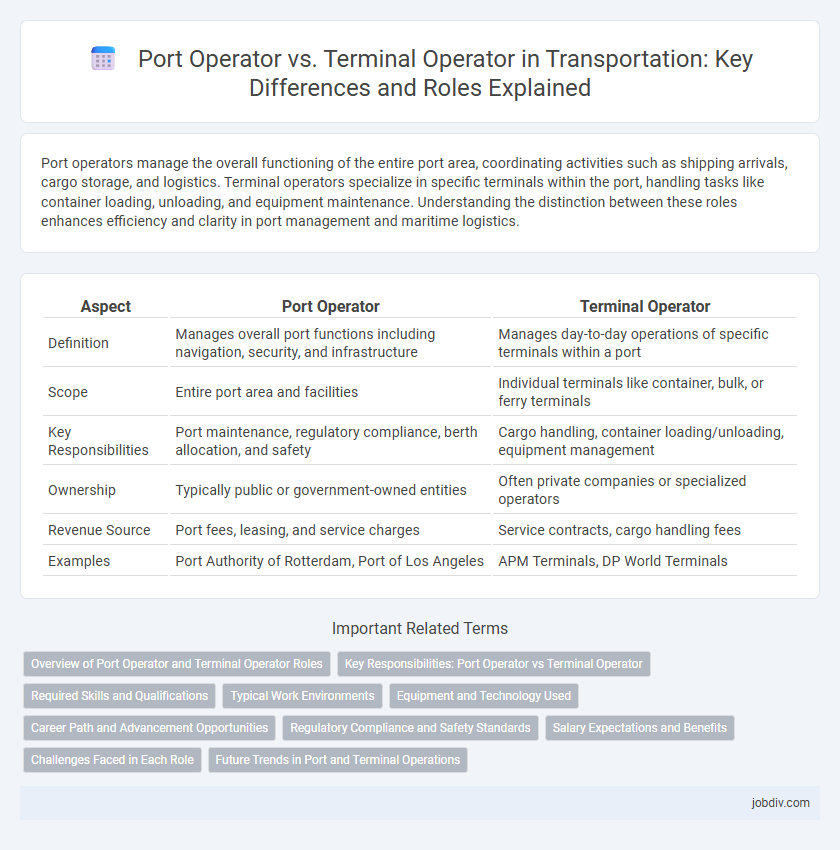Port operators manage the overall functioning of the entire port area, coordinating activities such as shipping arrivals, cargo storage, and logistics. Terminal operators specialize in specific terminals within the port, handling tasks like container loading, unloading, and equipment maintenance. Understanding the distinction between these roles enhances efficiency and clarity in port management and maritime logistics.
Table of Comparison
| Aspect | Port Operator | Terminal Operator |
|---|---|---|
| Definition | Manages overall port functions including navigation, security, and infrastructure | Manages day-to-day operations of specific terminals within a port |
| Scope | Entire port area and facilities | Individual terminals like container, bulk, or ferry terminals |
| Key Responsibilities | Port maintenance, regulatory compliance, berth allocation, and safety | Cargo handling, container loading/unloading, equipment management |
| Ownership | Typically public or government-owned entities | Often private companies or specialized operators |
| Revenue Source | Port fees, leasing, and service charges | Service contracts, cargo handling fees |
| Examples | Port Authority of Rotterdam, Port of Los Angeles | APM Terminals, DP World Terminals |
Overview of Port Operator and Terminal Operator Roles
Port operators manage the overall logistics and infrastructure of a seaport, coordinating vessel arrivals, cargo handling, customs clearance, and maintenance of port facilities. Terminal operators specialize in managing specific terminals within the port, overseeing container storage, equipment operations, and efficient loading and unloading of cargo. Both roles are crucial for seamless maritime transportation and supply chain efficiency, with port operators focusing on macro-level port management and terminal operators handling micro-level terminal functions.
Key Responsibilities: Port Operator vs Terminal Operator
Port operators oversee the management and coordination of multiple terminals within a harbor, focusing on overall port logistics, regulatory compliance, and infrastructure maintenance. Terminal operators specialize in the efficient handling of cargo operations within a specific terminal, including container storage, loading and unloading of ships, and equipment management. Both roles require expertise in supply chain coordination, safety protocols, and real-time operational monitoring to optimize throughput and minimize turnaround time.
Required Skills and Qualifications
Port operators require strong logistical planning, knowledge of maritime regulations, and expertise in vessel scheduling to ensure efficient port operations. Terminal operators need skills in cargo handling, equipment management, and safety compliance to oversee loading and unloading processes effectively. Both roles demand excellent communication abilities and proficiency in using transportation management systems.
Typical Work Environments
Port operators typically manage activities across the entire port area, including shipping lanes, berths, and customs zones, working within expansive outdoor environments subject to weather conditions. Terminal operators focus on specific cargo terminals, processing containerized or bulk goods in controlled, often semi-enclosed spaces equipped with cranes, conveyors, and storage yards. Both roles require coordination with logistics teams, but terminal operators usually work closer to handling equipment and storage facilities, emphasizing operational efficiency within confined terminal precincts.
Equipment and Technology Used
Port operators primarily manage large-scale infrastructure including cranes, bulk handling equipment, and automated stacking cranes to facilitate vessel loading and unloading. Terminal operators specialize in deploying advanced gate automation systems, terminal operating software (TOS), and container handling machinery such as reach stackers and straddle carriers to optimize yard operations. Integration of IoT sensors and AI-driven analytics enhances both port and terminal operations by improving equipment utilization and real-time decision-making efficiency.
Career Path and Advancement Opportunities
Port operators often oversee large-scale logistics and vessel scheduling, offering career paths that lead to roles in maritime management, operations coordination, and regulatory compliance. Terminal operators specialize in cargo handling, equipment management, and yard operations, with advancement opportunities into supervisory positions, logistics planning, and supply chain analysis. Both roles require strong organizational skills and provide upward mobility through certifications and experience in transportation and maritime industries.
Regulatory Compliance and Safety Standards
Port operators are responsible for overseeing the entire port facility, ensuring compliance with national and international maritime regulations such as SOLAS and ISPS codes. Terminal operators focus on managing specific terminal areas, adhering to safety standards like OSHA regulations and implementing precise cargo handling protocols to prevent accidents. Both entities collaborate to maintain stringent safety management systems, minimizing operational risks and ensuring secure, efficient port operations.
Salary Expectations and Benefits
Port operators typically earn higher salaries than terminal operators due to the broader scope of responsibilities involving entire port management, with average annual compensation ranging from $70,000 to $120,000. Terminal operators usually receive salaries between $45,000 and $80,000, reflecting their focus on specific cargo handling and logistics at individual terminals. Benefits for both roles often include health insurance, retirement plans, and performance bonuses, but port operators may access more comprehensive packages aligned with senior management positions.
Challenges Faced in Each Role
Port operators encounter challenges related to managing large-scale infrastructure, coordinating maritime traffic, and adhering to environmental regulations to ensure smooth port operations. Terminal operators face difficulties in optimizing cargo handling efficiency, maintaining equipment reliability, and managing workforce safety within confined terminal spaces. Both roles require advanced logistics technology and real-time data integration to overcome operational bottlenecks and enhance supply chain performance.
Future Trends in Port and Terminal Operations
Port operators are increasingly adopting automation technologies and AI-driven analytics to streamline cargo handling and improve efficiency, aligning with the surge in global trade volume. Terminal operators focus on integrating IoT sensors and digital twin models to enhance real-time monitoring and predictive maintenance, reducing downtime and operational costs. The convergence of smart infrastructure and sustainable practices, such as electric-powered equipment and green energy integration, is set to redefine port and terminal operations towards resilience and environmental compliance.
Port Operator vs Terminal Operator Infographic

 jobdiv.com
jobdiv.com